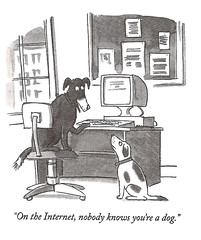"On the Internet, nobody knows you’re a dog," says the famous New Yorker cartoon, to which I’d add, yet.
On the Internet, people may not know you’re a dog, or a CEO, but they can find out. Whole Foods‘ CEO John P. Mackey discovered that brutal fact yesterday when news broke outing him as Rahodeb (i.e. Deborah, his wife), an online persona he created in order to anonymously champion himself and his company’s stock on Yahoo Finance‘s message boards.
During seven years of online anonymity, Mackey posted 1,394 messages, according to 24/7 Wall St. Among those posts were glowing missives about one John P. Mackey. According to Stockpickr’s The Best Collected Works of John Mackey post, on January 19, 2000 Rahodeb said (emphasis mine):
Contrary to your argument it appears that WFMI is trading at a premium
to the market–not a discount. Does Mackey get credit for this premium
for being a brilliant CEO??!! Why else is the PE ratio so high for this
company?
While it is amusing to hear someone write so glowingly about themselves, it is also interesting from an online PR point of view to see a chief executive aggressively engaging an online audience. The only problem, obviously, is that he did it anonymously.
While you can hardly expect CEO’s to engage audiences on finance message boards because of the many inherent risks of doing so, engaging in online discussions is a practice corporate American will increasingly need to do as a standard PR tactic. But that will require them to drop Corpspeak and engage in a genuine dialog.
Mark Cuban is a pioneer in just such communications with his Blog Maverick blog.
Ironically, Mackey can count himself as one of the new communicators among American CEOs with his very own blog at the Whole Foods site. One of the articles of faith of the blogosphere is the issue of transparency; the more honest and open you are as a blogger, the more credibility you’ll have with your readers. It is surprising, then, that as a blogger, Mackey apparently did not get that.
Beyond that, though, it is stunning that the consequences of being outed didn’t prevent Mackey from posting anonymous messages to a financial message board in the first place.
There’s a standard that used to be applied to email but works equally as well for any online communications: Don’t post anything that you wouldn’t want to see printed on the front page of the New York Times.
The fact that people can collaborate so easily online means that if a given group of people want to discover the identity of an anonymous online participant, they probably can through using open source research, if you will.
The fallout in Mackey’s case is substantial: Negative publicity for himself and his company and potential legal problems.
The reputation management advice I’d give to anyone considering such a tactic is Don’t Do It!
The e-Strategy Academy covers all aspects of digital marketing including search optimization & marketing, email marketing, social media marketing, video marketing, mobile marketing & public relations.
